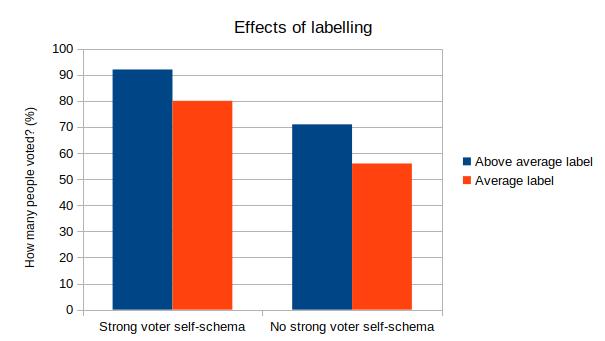Ever been labelled? Ever labelled someone yourself? Everyone’s done both, sometimes it’s benign, sometimes it’s a good thing and sometimes it’s a bad thing. It starts from an early age and continues through life – he’s a jock, he’s conscientious, she’s a troublemaker. Assigning labels to things seems to be part of how our brain makes sense of the world. But what happens to a person when you give them a particular label?
Researchers Alice Tybout and Richard Yalch devised an ingenious way to test this. A week or so before an election, they went door-to-door, surveying people about their attitudes towards the different candidates and some current issues. Then, while still in front of the participant, they compared the survey answers to a voter profile for an “average” citizen, and told the participant that, based on their answers, the likelihood they would vote was either average, or above-average. In reality, however, the voter profile was fake and this label was given randomly.
Here’s how the labels were specifically given:
Above average label:
“That’s interesting, your proftle indicates that, relative to others in this community, you are an above-average citizen. Our research shows that people like you are very likely to vote in elections and participate in political events.”
Average label:
“That’s interesting, your profile indicates that, relative to others in this community, you are an average citizen. Our research shows that people like you have an average likelihood of voting in elections and participating in poitical events.”
As you can see, the label seemed to come from a place of authority, and they made sure that the participants knew what was expected of people with this particular label. So how did these labels affect voter turnout? As you might have guessed, labelling people as likely to vote did increase turnout – 86.5% of this group voted, versus 75.3% of the ‘average’ group. But have a look at the chart below:

The label had the strongest effect on people who already thought of themselves as voters; who had what psychologists call a “self-schema” for voting. A ‘self-schema’ (pronounced skeema) is a generalisation you make about yourself based on your previous behaviour and experiences. A self-schema will tend to affect how you interpret and respond to other information you receive about yourself.
In this case, for example, people were more likely to vote when their self-scheema and the label they received were congruent. Make sense? Assuming this is true for every self-schema, you can see some practical application. Labelling your workforce as a hard workers will have a bigger effect on productivity if they already see themselves as hard workers; though it will still have some effect if they don’t.
You can see that when people already have a self-schema as being the voting type, telling them they are an average voter will make them more likely to vote than telling people who don’t have this self-scheema, that they are above-average citizens. This might be because we don’t pay as strong attention to things when they don’t match our self-schema. Or maybe, simply talking about political issues was enough to get these eager voters fired up.
How long does a label last?
Less than eight months, apparently. In a following election, eight months later voter turnout overall had dropped to 54% for the group labelled above average, and 53% for the average group. Labelling only seems to work in the short-run, probably because many other different labels, cues and primes will come along over time, and they might override a label that was only given once.
Practical Applications
This is another example of how a something deceptively simple can affect peoples’ behaviour. There are plenty of ways that labelling can be ethically applied. Teachers could tell students that they seem able and competent, managers can tell their staff they are up to the task, and you can tell your date that she definitely seems like the type of girl who’d come home with you (OK, maybe not the last one!).
What I’d want to know it how authority affects labels. For example, if you really like and respect your teacher, and she tells you that she’s been keeping an eye on you and she really sees potential in you, you could go a long way, would that have a bigger effect than if one of your classmates said it, for instance? You also have to wonder, if a police officer tells you that you’re worthless criminal scum, what effect does that have on you?
I wonder what would happen if the police went around acting genuinely surprised whenever someone committed a crime, and absolutely insisted, to the full extent of their authority, that the perpetrator was a law-abiding, upstanding citizen, and the couldn’t understand why they did it. Maybe some people would just bow down to the authority “I am? Oh. Didn’t realise officer, my bad!”
Another application is you can become more aware of attempts to label you, particularly by advertisers. This is definitely something you should do, I mean, after all, you’re worth it. And if you can figure out your self-schema, you’ll be able to see what types of labels are more likely to affect you.
Oh, by the way, I was analysing my web traffic statistics yesterday, and I suddenly realised that readers of Generally Thinking are a loyal, intelligent and open-minded bunch, who like to visit this site regularly!
Recommended Reading:
Reference:
Tybout, A. M., Yalch, R. F. (1980). The Effect of Experience: A Matter of Salience? Journal of Consumer Research, 6, 406-413.